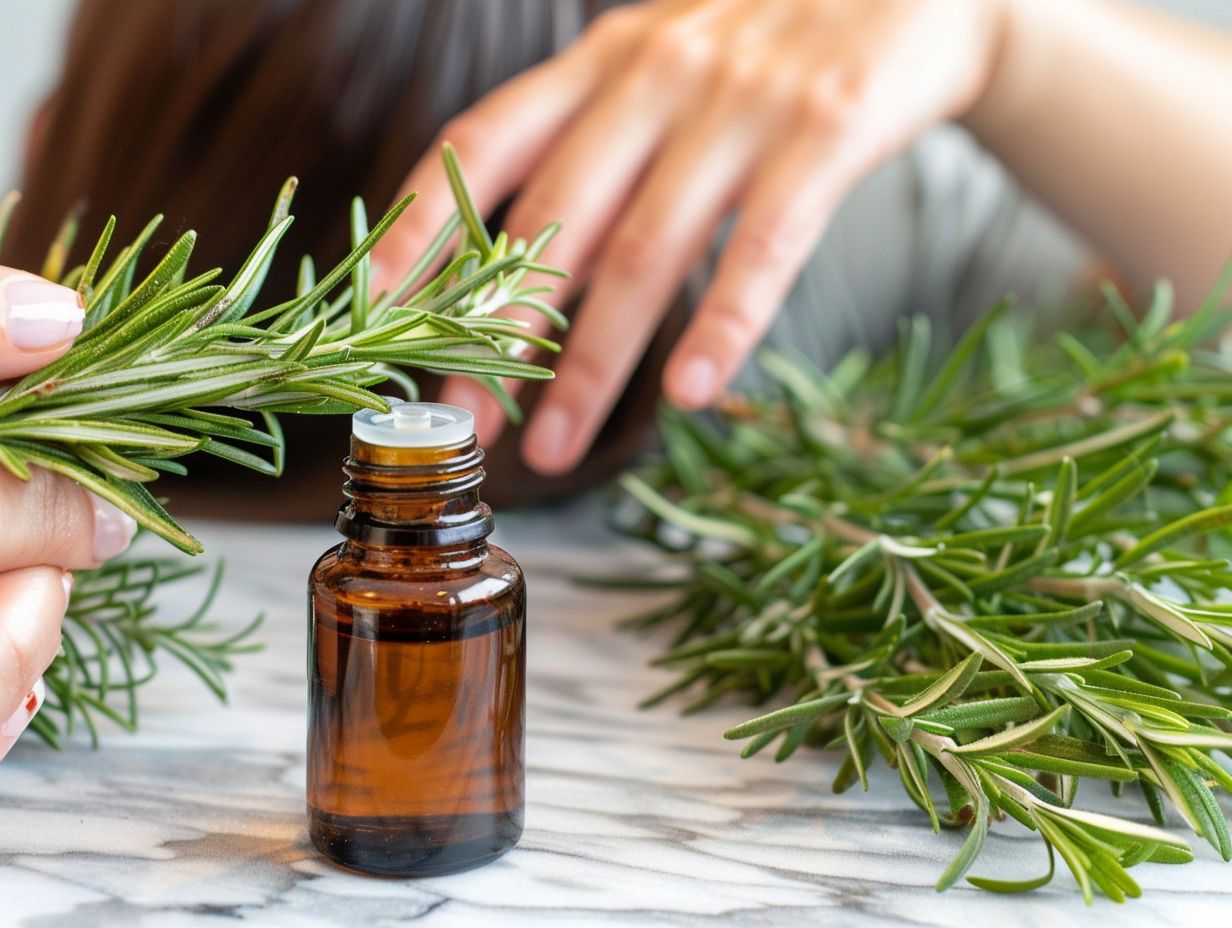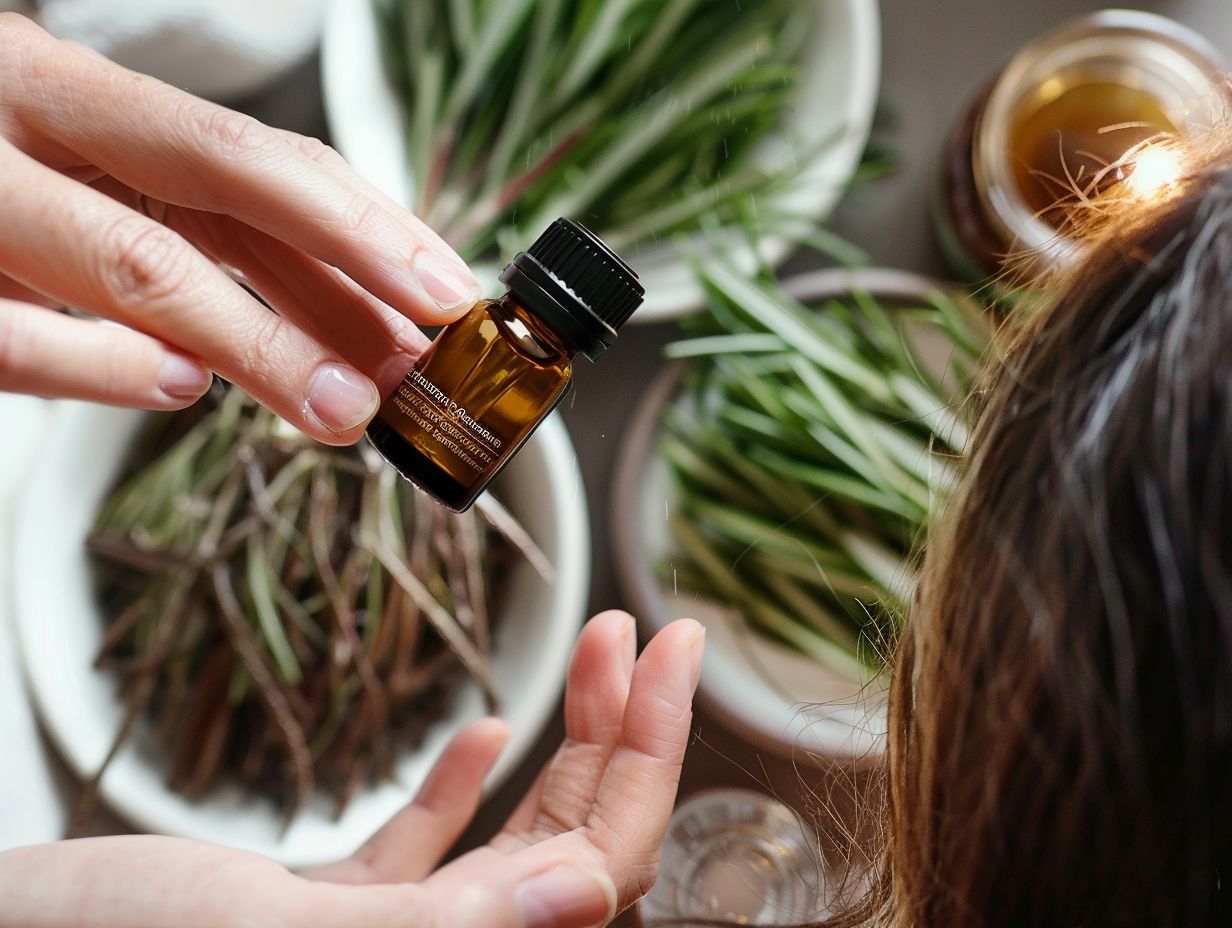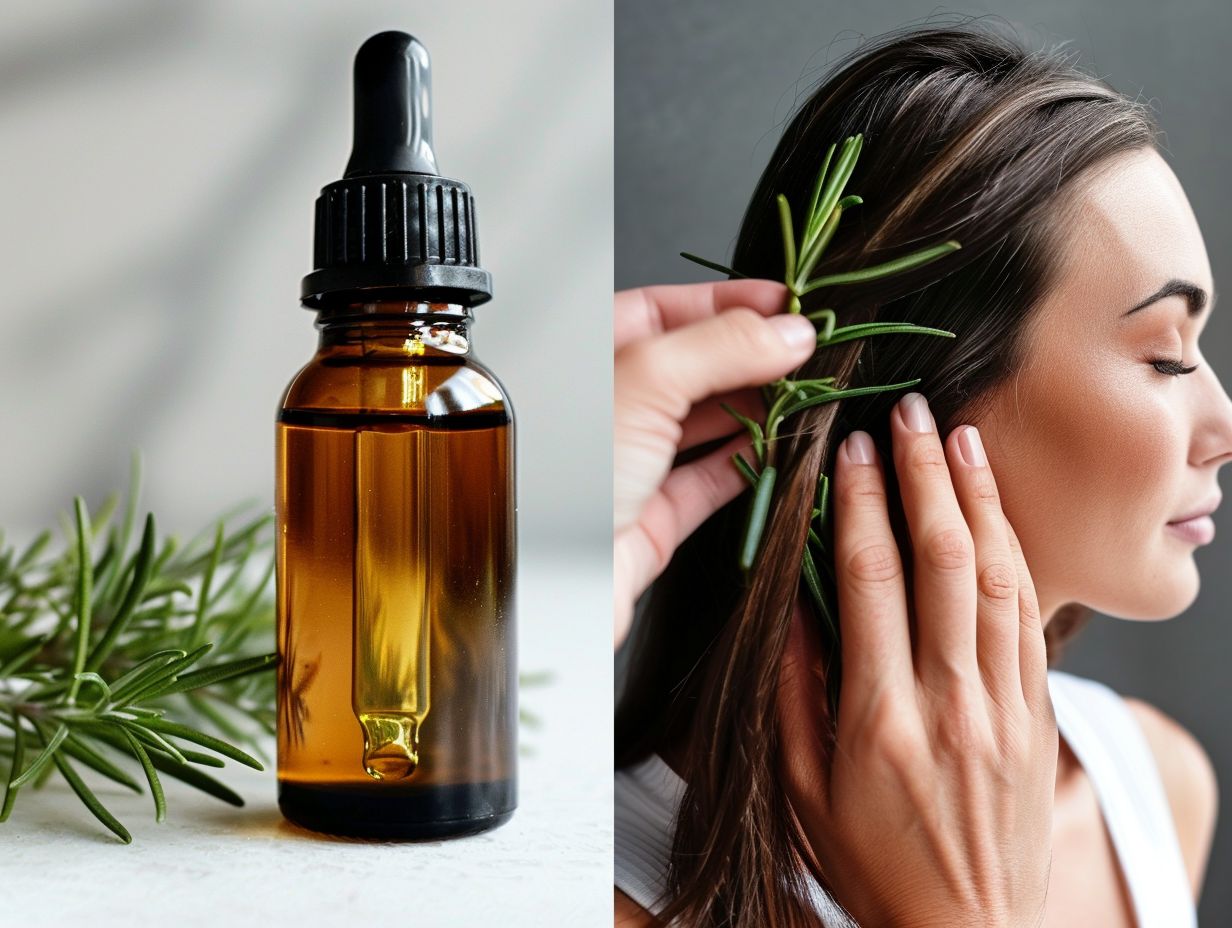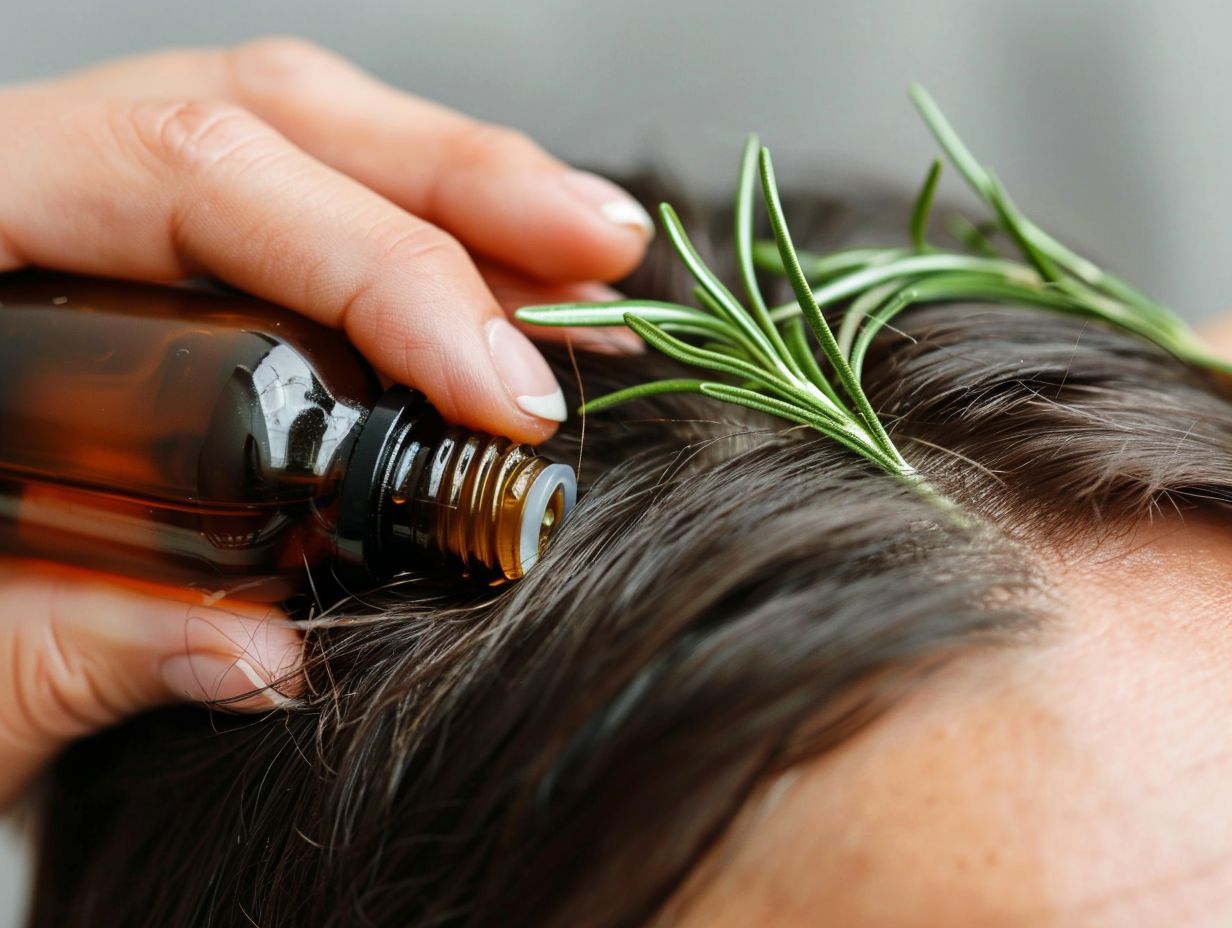Does Rosemary Essential Oil Promote Hair Growth
Rosemary essential oil is not just a fragrant herb used in cooking; it also offers a multitude of benefits for hair growth and overall health. From promoting hair growth to reducing hair loss and preventing dandruff, this essential oil has become a popular choice for those looking to improve the health of their hair.
In this article, we will explore the different ways to use rosemary essential oil for hair growth, its safety, potential side effects, and other uses beyond hair care. So, let’s dive in and discover the wonders of rosemary essential oil!
Key Takeaways:
What Is Rosemary Essential Oil?
Rosemary essential oil is a highly concentrated extract derived from the rosemary plant. It is widely used in aromatherapy and skincare due to its aromatic and medicinal properties.
The distillation process of rosemary essential oil involves steaming the fresh flowering tops of the rosemary plant to extract its potent essence. Rich in camphor, cineole, and other active compounds, this oil has been used for centuries in traditional medicine for its anti-inflammatory, antimicrobial, and antioxidant properties.
Commonly found in shampoos, lotions, and massage oils, rosemary essential oil is known to promote hair growth, boost cognitive function, relieve stress, and improve digestion. It can also be blended with carrier oils for topical application or diffused to freshen the air and enhance mental clarity.
How Is Rosemary Essential Oil Extracted?
The extraction of rosemary essential oil involves steam distillation of the rosemary leaves to capture the aromatic compounds present in the plant.
During steam distillation, water is heated to produce steam that passes through the rosemary leaves, causing the essential oils to evaporate. The steam carrying the essential oil vapors is then cooled and condensed back into a liquid. This liquid mixture separates into two layers: the rosemary essential oil floats on top of the condensed water. The essential oil is then carefully extracted and undergoes further processing to ensure its purity and potency.
What Are The Benefits Of Rosemary Essential Oil?
Rosemary essential oil offers a range of benefits for hair and scalp health, including promoting hair growth, stimulating blood circulation, and providing nourishment to the hair follicles and scalp.
Rich in antioxidants and nutrients, rosemary essential oil can help combat hair loss, strengthen hair roots, and improve the overall quality of hair. Its antibacterial and antifungal properties make it effective in preventing dandruff and other scalp conditions. Regular use of rosemary essential oil can also add shine, luster, and thickness to the hair, making it a versatile addition to any hair care routine.
Promotes Hair Growth
Rosemary essential oil is known to promote hair growth by stimulating the hair follicles and improving circulation to the scalp.
Rosemary oil contains properties that can help in increasing the cellular metabolism, which in turn aids in hair follicle function.
Its anti-inflammatory and antioxidant properties boost overall scalp health, reducing issues like dandruff and itchiness that can hinder hair growth.
Regular use of rosemary oil can also help strengthen hair roots, preventing breakage and promoting thicker, healthier hair.
Stimulates Blood Circulation
The application of rosemary oil can help stimulate blood circulation when massaged into the scalp, promoting overall scalp health and hair growth.
Rosemary oil is known for its ability to dilate blood vessels, allowing for better circulation to the hair follicles. This increased blood flow delivers essential nutrients to the follicles, promoting healthier hair growth and reducing the risk of hair shedding. The act of scalp massage enhances the absorption of rosemary oil and further boosts its effectiveness in nourishing the scalp.
Regular use of rosemary oil in scalp massage routines can also help strengthen hair follicles, leading to thicker, fuller hair over time. The aromatic properties of rosemary oil not only provide a soothing experience during the massage but also contribute to a calming effect, promoting relaxation and reducing stress levels that can negatively impact hair health.
Reduces Hair Loss

Rosemary oil has been shown to reduce hair loss and aid in regrowing hair, making it a popular choice for individuals experiencing hair thinning or alopecia.
One of the key reasons behind the effectiveness of rosemary oil lies in its potent ability to stimulate blood circulation in the scalp, promoting hair follicles’ health and encouraging hair growth. This natural oil also contains antioxidants that help to combat free radicals, which may contribute to hair loss. Rosemary oil possesses anti-inflammatory properties that can soothe the scalp, reduce dandruff, and create an optimal environment for healthy hair growth.
Prevents Dandruff
When used in scalp treatments, rosemary oil can help prevent dandruff by soothing and nourishing the scalp, maintaining scalp health and hydration.
Rich in antioxidants and antimicrobial properties, rosemary oil not only calms irritated scalps but also promotes blood circulation, ensuring essential nutrients reach hair follicles for optimal growth. Its anti-inflammatory effects can alleviate itching and redness, addressing common symptoms of dandruff. The purifying nature of rosemary oil assists in cleansing hair follicles, removing excess sebum and dead skin cells that contribute to dandruff formation. Regular use of this essential oil can also stimulate hair follicles, leading to stronger and healthier hair from the roots to tips.
What Are The Different Ways To Use Rosemary Essential Oil For Hair Growth?
There are several effective ways to use rosemary essential oil for promoting hair growth, including topical application, hair rinses, and hair masks.
Rosemary essential oil is commonly used topically by mixing a few drops with a carrier oil like coconut or olive oil, then massaging it into the scalp to stimulate hair follicles and improve circulation. Incorporating rosemary oil into hair rinses can help to strengthen hair strands and reduce breakage, leading to healthier and thicker hair over time.
Another popular method is creating homemade hair masks by combining rosemary oil with natural ingredients like honey, avocado, or yogurt. These masks not only nourish the scalp but also provide essential nutrients that can promote hair growth and combat dandruff.
Topical Application
Topical application of rosemary oil involves directly applying the oil to the scalp to nourish the hair follicles and promote hair growth.
Rosemary oil, derived from the aromatic herb Rosmarinus officinalis, contains powerful antioxidants that can help stimulate blood circulation in the scalp, thereby assisting with the delivery of essential nutrients to the hair roots. This increased blood flow can aid in strengthening the hair follicles, preventing damage, and supporting healthier hair growth over time. The antibacterial and anti-inflammatory properties of rosemary oil can contribute to maintaining a clean and healthy scalp environment, reducing the chances of scalp irritation or dandruff.
Hair Rinse
Incorporating rosemary oil into a hair rinse can enhance your hair care routine by providing nourishment to the scalp and hair strands.
Rosemary oil is renowned for its ability to improve circulation in the scalp, promoting healthy hair growth and thickness. Its antibacterial properties can help prevent scalp infections, while its antioxidant content protects hair from damage caused by free radicals.
The refreshing scent of rosemary oil can invigorate your senses and provide a calming effect, making it a delightful addition to your hair care regimen. Regular use of rosemary oil in hair rinses can also help balance oil production, keeping your scalp hydrated without being greasy.
Hair Mask
Creating a hair mask with rosemary oil can deeply nourish the hair and scalp, providing a revitalizing treatment for promoting hair growth.
Rosemary oil is known for its stimulating properties that can enhance circulation in the scalp, promoting healthier hair growth. To prepare a nourishing hair mask, mix a few drops of rosemary oil with a carrier oil such as coconut or olive oil.
Apply the mixture evenly to your scalp and hair, massaging gently to ensure it is absorbed. Leave the mask on for at least 30 minutes to allow the nutrients to penetrate the hair follicles.
Rinse thoroughly with lukewarm water and a mild shampoo to remove any residue, revealing softer, shinier hair.
Is Rosemary Essential Oil Safe For Hair Growth?

While rosemary essential oil is celebrated for its ability to stimulate hair growth and improve overall hair health, there are a few considerations to keep in mind to ensure its safe usage. Some individuals may experience skin irritation or allergic reactions when using rosemary essential oil, especially if applied directly to the scalp without proper dilution.
It’s important to perform a patch test before applying the oil to your scalp to check for any adverse reactions. Pregnant women, children, and individuals with certain medical conditions should consult a healthcare professional before using rosemary essential oil for hair growth.
Potential Side Effects
While rare, some individuals may experience skin irritation or allergic reactions when using rosemary essential oil, especially if sensitive to essential oils.
These reactions may manifest as redness, itching, or a rash on the skin.
It is crucial to perform a patch test before using rosemary oil topically by applying a small amount to the inner arm or wrist and waiting 24 hours to check for any negative outcomes.
If any adverse effects such as swelling, hives, or difficulty breathing occur, it is essential to seek medical advice promptly.
Pregnant or breastfeeding individuals, people with epilepsy or high blood pressure, and those on certain medications should consult a healthcare professional before using rosemary oil.
Precautions To Take
To ensure safe usage of rosemary oil for hair growth, individuals should dilute the oil properly, perform a patch test, and avoid prolonged exposure to the scalp.
When diluting rosemary oil, it is crucial to follow recommended ratios to prevent skin irritation. Typically, a 2-3% dilution is considered safe this equates to about 12 drops of rosemary oil per ounce of carrier oil.
Performing a patch test before applying rosemary oil directly to the scalp can help identify any potential allergic reactions. Apply a small amount to a discreet area of skin and wait 24 hours to check for redness, itching, or inflammation.
Maintaining a healthy scalp is essential to maximize the benefits of rosemary oil. Avoid using the oil excessively, as it may lead to scalp irritation or dryness.
What Are The Other Uses Of Rosemary Essential Oil?
Apart from promoting hair growth, rosemary essential oil has various other uses, including aromatherapy, skincare, respiratory health, and pain relief.
In terms of aromatherapy, rosemary essential oil is popular for its invigorating and uplifting scent. It can help improve focus, memory, and overall mood when diffused or inhaled. In skincare, this oil is valued for its antioxidant properties, which can help combat free radicals and promote youthful skin.
In terms of respiratory health, rosemary essential oil is known to have decongestant properties that can aid in clearing sinuses and relieving symptoms of respiratory issues. Its analgesic properties make it a beneficial option for managing various types of pain, including headaches and muscle soreness.
Aromatherapy
Rosemary oil is commonly used in aromatherapy due to its refreshing herbal scent and therapeutic properties that promote relaxation and mental clarity.
Known for its invigorating aroma, rosemary oil is a staple in the world of essential oils. Its distinct scent uplifts the senses and provides a sense of calmness, making it a popular choice for relaxation practices. In aromatherapy, rosemary oil is often used to alleviate stress and enhance mental well-being. This aromatic oil is believed to have mood-boosting effects that help to reduce anxiety and improve focus.
Skin Care
In skincare, rosemary oil is valued for its anti-inflammatory and antioxidant properties, making it a beneficial ingredient in various skincare products.
Rosemary oil is known for its ability to help reduce redness and swelling in the skin, making it a go-to choice for those with sensitive or acne-prone skin. Its nourishing properties can also help to improve skin tone and elasticity, giving a more youthful appearance.
The antioxidant effects of rosemary oil can protect the skin from environmental stressors and free radicals, helping to prevent premature aging and maintain a healthy complexion. Its invigorating aroma can provide a soothing and calming effect, promoting relaxation and stress relief when used in skincare routines.
Respiratory Health

Rosemary oil is known for its decongestant properties due to its ability to help relax and open up the airways, making it easier for someone to breathe. It can help alleviate symptoms of coughs, colds, and sinus infections by reducing inflammation and mucus buildup in the respiratory system.
Additionally, the aroma of rosemary oil can have a soothing effect on the respiratory tract, helping to calm irritation and improve overall lung function. When inhaled, its antimicrobial properties may even help fight off respiratory infections and boost the immune system.
Pain Relief
Rosemary essential oil is known for its soothing properties and is often used in massage blends to alleviate muscle aches and tension.
Rosemary oil’s pain-relieving abilities stem from its anti-inflammatory and analgesic properties, making it a popular choice for easing discomfort in sore muscles and joints. When applied topically, the oil penetrates the skin, providing a warm sensation that helps to relax tight muscles and improve circulation.
In massage therapy, rosemary oil is commonly combined with carrier oils like almond or coconut oil to create a blend that promotes relaxation and reduces inflammation. The aromatic properties of rosemary further enhance its therapeutic benefits, providing a calming and uplifting experience during a massage.
Frequently Asked Questions
Does Rosemary Essential Oil Promote Hair Growth?
Yes, rosemary essential oil has been shown to promote hair growth by stimulating blood circulation in the scalp and providing nutrients to hair follicles.
How do I use Rosemary Essential Oil to promote hair growth?
There are several ways to use rosemary essential oil for hair growth, including mixing it with a carrier oil, adding it to your shampoo or conditioner, or creating a DIY hair mask.
How often should I use Rosemary Essential Oil for hair growth?
It is recommended to use rosemary essential oil for hair growth 2-3 times a week for best results. However, it is important to do a patch test first and monitor your scalp’s reaction.
Are there any side effects of using Rosemary Essential Oil for hair growth?
In general, rosemary essential oil is safe to use for hair growth. However, some people may experience skin irritation or allergic reactions. It is important to dilute the oil properly and do a patch test before use.
What other benefits does Rosemary Essential Oil have for hair?
Aside from promoting hair growth, rosemary essential oil also has other benefits for hair such as reducing dandruff, adding shine and softness, and preventing hair loss.
Can I use Rosemary Essential Oil on colored or treated hair?
Yes, rosemary essential oil is safe to use on colored or treated hair. However, it is always best to do a patch test and consult with a professional before using any new product on your hair.








One Comment